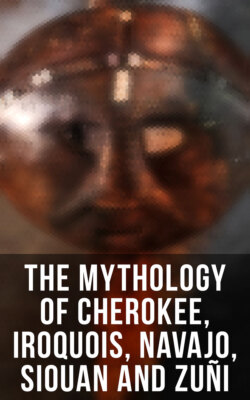Читать книгу The Mythology of Cherokee, Iroquois, Navajo, Siouan and Zuñi - James Mooney - Страница 212
На сайте Литреса книга снята с продажи.
The Story of Wabaskaha
ОглавлениеAn interesting story is that of Wabaskaha, an Omaha brave, the facts related in which occurred about a century ago. A party of Pawnees on the war-path raided the horses belonging to some Omahas dwelling beside Omaha Creek. Most of the animals were the property of Wabaskaha, who immediately followed on their trail. A few Omahas who had tried to rescue the horses had also been carried off, and on the arrival of the Pawnee party at the Republican River several of the Pawnees proposed to put their prisoners to death. Others, however, refused to participate in such an act, and strenuously opposed the suggestion. A wife of one of the Pawnee chiefs fed the captives, after which her husband gave them permission to depart.
After this incident quite a feeling of friendship sprang up between the two peoples, and the Pawnees were continually inviting the Omahas to feasts and other entertainments, but they refused to return the horses they had stolen. They told Wabaskaha that if he came for his horses in the fall they would exchange them then for a certain amount of gunpowder, and that was the best arrangement he could come to with them. On his way homeward Wabaskaha mourned loudly for the horses, which constituted nearly the whole of his worldly possessions, and called upon Wakanda, his god, to assist and avenge him. In glowing language he recounted the circumstances of his loss to the people of his tribe, and so strong was their sense of the injustice done him that next day a general meeting was held in the village to consider his case. A pipe was filled, and Wabaskaha asked the men of his tribe to place it to their lips if they decided to take vengeance on the Pawnees. All did so, but the premeditated raid was postponed until the early autumn.
After a summer of hunting the braves sought the war-path. They had hardly started when a number of Dakotas arrived at their village, bringing some tobacco. The Dakotas announced their intention of joining the Omaha war-party, the trail of which they took up accordingly. In a few days the Omahas arrived at the Pawnee village, which they attacked at daylight. After a vigorous defence the Pawnees were almost exterminated, and all their horses captured. The Dakotas who had elected to assist the Omaha war-party were, however, slain to a man. Such was the vengeance of Wabaskaha.
This story is interesting as an account of a veritable Indian raid, taken from the lips of Joseph La Flèche, a Dakota Indian.
